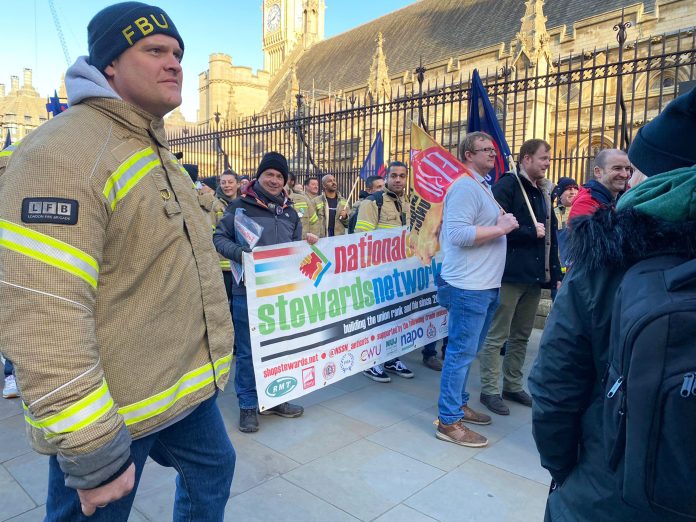Socialist Party member
The Fire Brigades Union (FBU) conference in May brought together hundreds of delegates just as the general election was called – an election likely to finally see the back of the Tories and the entry of a Labour government into Westminster.
The appetite for struggle by FBU members was reflected in one of the first conference debates, on the call for the union to set up a strike fund. Although opposed by the Executive Council (EC) at this conference and historically, the motion was passed.
In addition to vital debates on the policies and strategy to fight attacks to firefighters’ conditions, conference discussed key political issues facing the working class more generally.
Palestine
An EC statement on Palestine, introduced by general secretary Matt Wrack, sent solidarity to fire and rescue workers in Gaza and the West Bank, as well as the millions protesting internationally to end the slaughter, including student protesters in Britain.
The union leadership also raised the need for working-class action to halt arms sales to the Israeli state, as well as pointing towards the movement developing within Israel against Netanyahu’s government.
A motion moved by Devon and Somerset branch instructed the EC to “withdraw support from any prospective parliamentary candidate who has not supported the call for a ceasefire in Gaza”, and was passed.
The discussion on Gaza was followed by an EC policy statement on the general election, prepared in advance but taken for discussion after the election was called on the first day of conference. The introduction reflected the desperation of firefighters to ditch the Tory government, which has cut 12,000 jobs, hundreds of fire engines and a whole number of fire stations since 2010.
Starmer’s Labour
This was combined with anger against and mistrust of Starmer’s Labour in speeches by delegates from the floor. Many delegates spoke about the need for the union to remain prepared to fight industrially, should Labour attack FBU members’ jobs, wages and conditions.
Under the blows of Tony Blair’s New Labour, members voted to disaffiliate the FBU from the Labour Party. It was when Jeremy Corbyn was Labour leader that the FBU leadership won the argument among members to reaffiliate. Some delegates remarked that next year’s FBU conference will be an opportunity to review the union’s relationship with the Labour Party.
The EC laid out the need to maintain a struggle under a Labour government, and place demands on the Labour leadership to enact policies in the interests of FBU members, including ending the fragmentation of the fire service, improving pay and conditions, strengthening workers’ rights, and repealing anti-union laws.
But beyond calls to ‘hold Labour’s feet to the fire’, there was unfortunately limited comment on what concrete steps industrially and politically the union should take if Labour does not deliver.
Political voice needed
The EC policy statement read: “Our movement cannot merely rely on developments at Westminster and the devolved governments”. That of course is true – but that should not mean abandoning the potentially powerful weapon of supporting candidates that support trade union and socialist policies, to add to the pressure on Starmer.
Why stop at only withdrawing support for candidates who don’t support the union’s policies on Gaza – what about other issues that are union policy, such as cuts to the fire service?
Labour MP Ian Lavery’s address to conference wouldn’t have done much to alleviate the concerns of delegates about what a Labour government will mean for workers. He ended his speech referring to the first 100 days of the next government, telling delegates that Labour MPs would barely have the keys to their offices within the first 100 days, especially considering that ‘the money has run out’!
Socialists don’t accept that the money doesn’t exist to provide working-class and young people with a decent standard of living – rather that the resources and wealth which do exist are in the wrong hands. Placing those resources and wealth in public ownership under democratic workers’ control and management – to lay the basis for a socialist society – requires building a mass movement. And that movement will also need a political voice, a new mass working-class political party.








